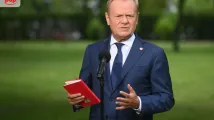Intel abandons planned projects in Poland and Germany
On Thursday, American technology company Intel announced that it was abandoning its planned investments in Poland and Germany. Intel had planned to open a semiconductor factory near Wroclaw.
On Thursday, the company published its second quarter results, and CEO Lip-Bu Tan announced significant cuts in the construction of integrated circuit factories.
Tan, who took over in March, stressed that the last few months "have not been easy."
He said the company had "completed most" of its planned layoffs, affecting 15 percent of its workforce. Intel had previously announced that it intended to reduce operating costs by USD 17 billion by 2025.
Tan also announced a number of other cuts, particularly in the division that manufactures integrated circuits for other companies.
"Over the past few years, the company has invested too much, too quickly, without sufficient demand. As a result, our manufacturing base has become unnecessarily fragmented and underutilised. We need to correct course," the CEO wrote in a letter to employees published on Thursday.
He added that in the future, Intel will expand factories in a way that is fully tailored to the needs of its customers.
"We will be prudent and disciplined in allocating capital (...)," he wrote.
"With this in mind, we have decided not to proceed with previously planned projects in Germany and Poland. We also plan to consolidate our assembly and testing facilities in Costa Rica with our larger facilities in Vietnam and Malaysia," Tan said.
In June 2023, Intel announced that it wanted to invest USD 4.6 billion in the construction of a semiconductor integration and testing plant in the municipality of Miekinia near Wroclaw. The investment in the Legnica Economic Zone was to create 2,000 jobs.
Europe's largest semiconductor factory was to be built in Germany. The German government was prepared to contribute EUR 10 billion to the construction of the American Intel plant in Magdeburg, worth EUR 30 billion.
Intel's shares rose 13percent this year, but in 2024 they recorded their worst decline in history, falling 60 percent, according to CNBC.
ndz/ piu/ seb/ han/
